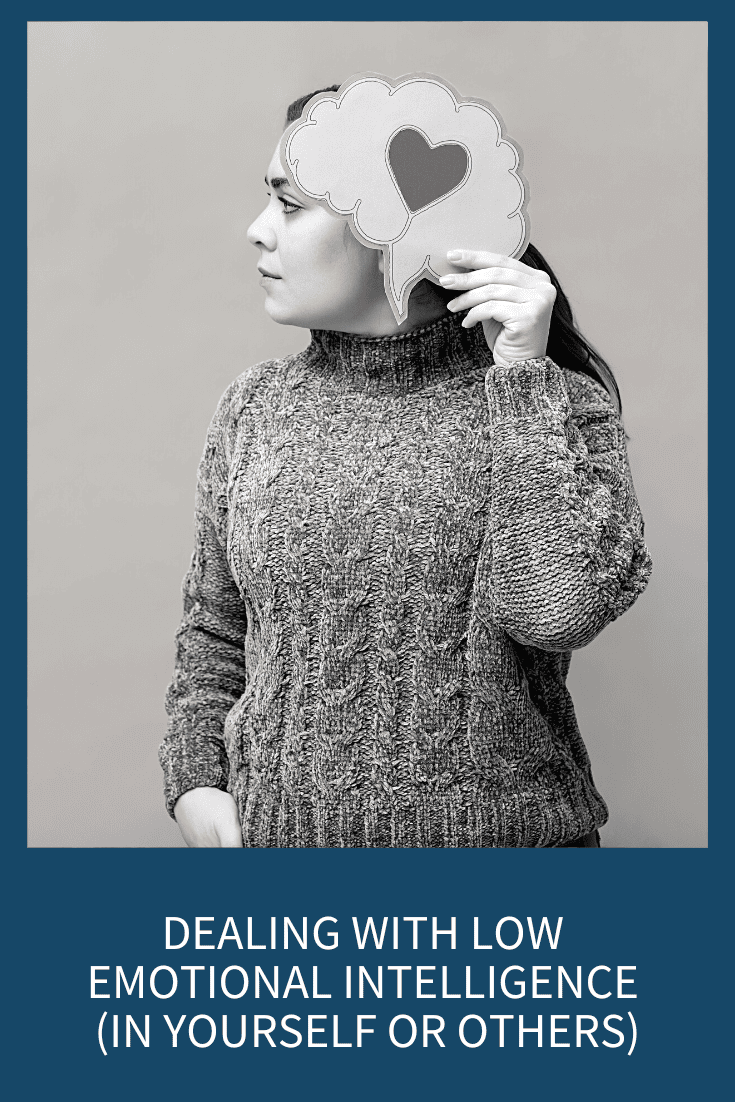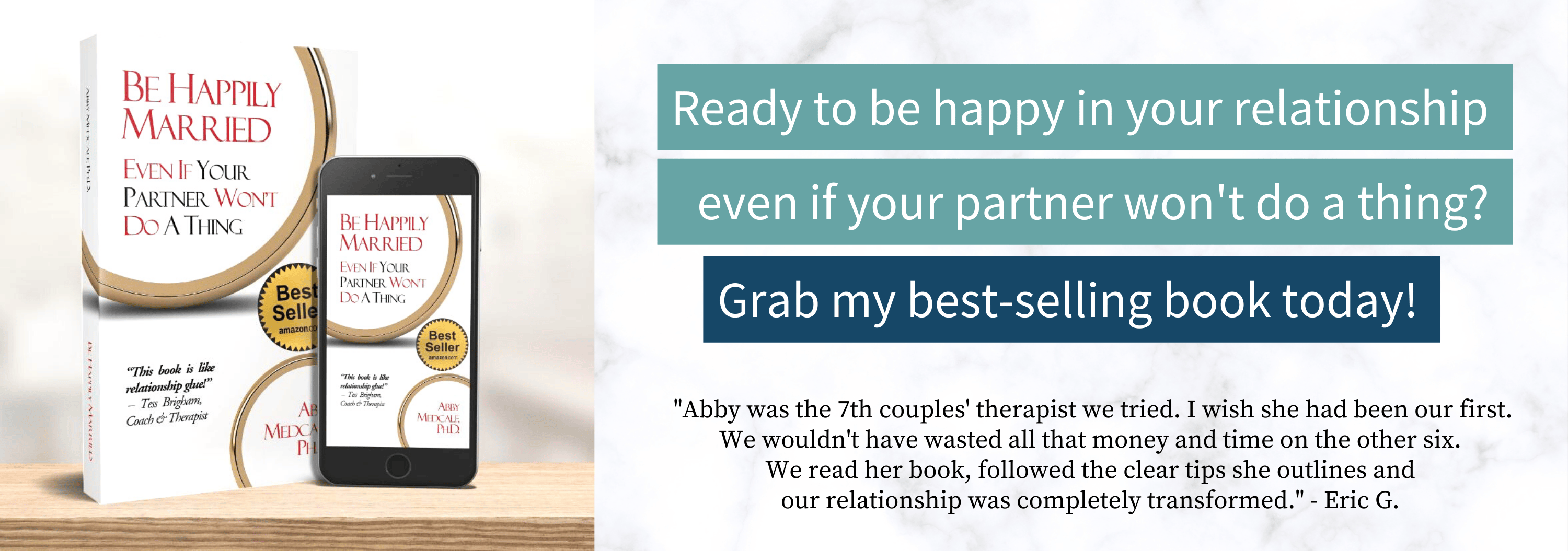
Do you know someone who has zero self-awareness? Do they seem to never understand your feelings? Do they have a hard time controlling or naming their own emotions? Or does any of this apply to you? If you answered “yes” to any of these questions, you’ve likely got someone in your life with low emotional intelligence (and they’re driving you crazy)! Or you, yourself, are struggling with the fallout from not having higher emotional intelligence and your relationships are feeling it. Today you’ll learn the components of emotional intelligence, why some people have a hard time in this area, and my top five tips for raising emotional intelligence.
11-minute read
Why Does Emotional Intelligence Matter?
Having higher emotional intelligence makes it easier to:
- Act, not react, and restrain your impulses
- Have more self-control when things are tense or difficult
- Be more optimistic and motivated, which relates to higher life satisfaction overall
Many experts now believe that your emotional intelligence, or EQ is more important than your IQ in determining your overall success in life. And emotional intelligence can definitely be learned! A landmark meta-analysis study that looked at the outcomes of kids enrolled in social and emotional learning programs in schools found that about 50% had better achievement scores, 40% had improved GPAs, and this group had lower suspension rates, fewer disciplinary problems and increased school attendance!
What is EQ Exactly?
Emotional intelligence is often referred to as EQ which means emotional quotient. The term was first coined in 1990 in a research paper by psychology professors John Mayer of the University of New Hampshire and Peter Salovey of Yale.
Mayer defined emotional intelligence as “the ability to accurately perceive your own and others’ emotions; to understand the signals that emotions send about relationships; and to manage your own and others’ emotions.”
Simply put, emotional intelligence is a skill where you can recognize and manage your own feelings while also recognizing and responding effectively to other people’s feelings.
In 1998, Rutgers psychologist Daniel Goleman made emotional intelligence famous in a Harvard Business Review article called “What Makes a Leader.” He’s since published many books about EQ and has become the figurehead for the movement. Goleman initially identified five areas for emotional intelligence for leaders but reconfigured his definition in 2002 with a four-quadrant model divided into two halves. One half is focused on your own emotions, and the other is about how you deal with other people’s emotions.
When we’re talking about your own emotions, the emphasis is on self-awareness and self-management. Self-awareness includes your emotional self-awareness, being able to have an accurate self-assessment, your self-confidence, recognizing how your behaviors impact others, and also seeing how others influence your emotional state. Self-management includes your emotional self-control, flexibility in different situations, your transparency or honesty, being able to clearly express your ideas and feelings, and handling conflict effectively.
On the other side of the grid, the other two quadrants are focused on how you play with other people. The two quadrants here are social awareness and relationship management. Your social awareness includes your empathy, picking up on the mood in the room, being an effective listener, and being approachable. Relationship management includes how you influence and support others, your ability to build bonds, to collaborate, and, basically, how you get along with other people.
Recognition/Awareness
Self-Awareness Emotional Self-Awareness Accurate self-assessment Self-confidence Recognizing how your behavior impacts others Seeing how others influence your emotional state —– |
Social Awareness Empathy Service Caring what others are going through Picking up o the mood in the room Listening well Approachable |
Self-Management Emotional self-control Transparency/Honesty Flexibility Clearly expressing ideas and feelings Getting along well in different situations Handling conflict effectively |
Relationship Management Influence Supporting others Collaboration Building Bonds Getting along with other people Getting along with other people |
Regulation/Control
Five Signs of Low Emotional Intelligence
- Low Self-Awareness: These are the fish who don’t know they’re wet. They don’t realize that they have feelings and that they’re driving their behavior. This results in them being judgmental and black-and-white in their thinking. They say things like, “anyone would think that” or “any sane person would agree.” Because of their all-or-nothing thinking, they have a hard time seeing where they’re wrong in situations and have a very hard time truly listening.
- Insensitivity: It might seem like they’ve got a sensitivity chip missing or like they’re a bit tone-deaf to what’s really happening or what people are really feeling. There’s a general lack of empathy, and this person is likely someone who is always saying the wrong thing or being inappropriate in different situations.
- Low Frustration Tolerance: people with a low EQ get easily defensive and can either lash out or give you the cold shoulder/withdraw at the slightest provocation. Handling others’ (or their own) emotions wears them out quickly. Because of this, they’re quick to point fingers and assign blame while taking little personal responsibility. There’s a lot of victim language, “He made me do it” or “I had no choice.” This also results in emotional outbursts of rage or crying fits. Emotions are just so uncomfortable, and they don’t handle them well.
- Relationship Issues Everywhere: People with low EQ generally have no intimate friendships or relationships, meaning that they don’t get emotionally close to others and aren’t vulnerable (ever). So, their interpersonal relationships are rocky with lots of judgment, blame and arguments or on the other side, being super avoidant. This can look like not having friends or having a friend group where there isn’t any deep connection.
- Self-Centeredness: People with low emotional intelligence can also seem to be narcissistic. They’ll often talk too much or take over conversations; they get defensive and angry when confronted or given feedback, are often tone-deaf to what’s truly going on around them and generally have to always be right. In other words, they seem to often “miss the point” in conversations, and it can feel difficult to get through to them. In addition, they might brag or subtly drop hints about their accomplishments or wins.
Why Do People Have Low EQ?
Low emotional intelligence comes from three main sources: your family or upbringing as a kid, mental health issues, or alexithymia.
How You Were Raised
Emotional awareness is something that develops early in your life. Kids grew into adults with higher emotional intelligence when their parents or primary caregivers did the following:
- Talked about their own feelings and were able to express and regulate them well
- Encouraged their kids to identify and share their feelings
- Validated feelings while responding quickly to their needs
- Showed love, support, and compassion
It’s easy to see how kids who grow up in families with low emotional intelligence end up not being able to manage their own emotions well since, again, identifying and regulating feelings is a skill that they never learned.
Mental Health Issues
A common sign of different mental health issues is difficulty managing (or identifying) emotions. We see it in people with depression, anxiety, borderline personality disorder, narcissistic personality disorder, and substance use disorder, to name a few.
Alexithymia
People with this condition have difficulty recognizing and expressing emotions. Alexithymia can result from childhood trauma, stroke, autism, or brain injuries.
Five Tips to Deal with Someone with Low Emotional Intelligence (or Raise Your Own):
It is possible to raise emotional intelligence, but it’s definitely a process that takes time. In the beginning, it can feel artificial and awkward, but given time, practice will increase emotional intelligence along with emotional regulation. Here are my top four tips:
Tip #1: Ninja Listening
Being a good listener is at the heart of raising emotional intelligence. People with low emotional intelligence are usually oblivious to other people’s feelings or to what they’re really saying. The bottom line is that if you want to communicate and connect, you’ve got to listen first. I covered my five steps to great listening way back in episode 72.
But I’ll give you the short version here:
- Set the scene: good timing and no distractions
- Check-in with yourself and get in a good place before the conversation
- Set intention
- Focus and notice your thoughts and feelings as they speak
- Evaluate those thoughts and feelings before responding
Basically, you want to listen like you’re wrong.
If you notice the other person getting defensive, you’ve got to check how you’re speaking to them. Defensiveness gets worse when we feel like the other person is responding to us in a negative way. If we feel criticized, rejected, or stigmatized in any way, we get more defensive. However, defensiveness is reduced when we feel secure, respected, and valued. So, what you want to do is make sure the other person feels respected and valued even if you disagree with their views or actions.
Tip #2: Practice Identifying Feelings
Identifying feelings is at the heart of truly raising emotional intelligence. The problem for most people is that they don’t know what they’re feeling half the time because they haven’t developed that skill. Yup. Identifying feelings in yourself and others is a skill, and with practice, you can get good at it.
I want to take a minute and ask how you’re feeling right now. Really. Take a second and say out loud how you’re feeling. What generally happens is one of the following:
- We respond with a thought, not a feeling. Just now, you might have said out loud, “I’m feeling like this is so helpful,” or “I’m feeling like Abby is speaking directly to me today!” These are wonderful thoughts, but they’re not feelings. Any time you say, “I feel that..” or “I feel like…” you’re not naming a feeling; you’re naming a thought.
- You also might respond with, “I don’t feel anything.” You’re always feeling something because you’re always thinking something.
- Similarly, you might say, “I feel OK/fine/good.” This is the same as saying you feel nothing. There are, literally, hundreds of feelings (I hear you gasping!) so pick one! Dig deep and get under it to a more nuanced feeling. “I feel content, satisfied, replete, joyful, calm, peaceful, serene, curious, open, willing…” you get the idea.
In the end, it’s important to remember that we connect with feelings, not thoughts. So, get to those feelings for yourself and help the other person do the same. Ask them often how they’re feeling, and make sure they answer with a feeling, not a thought!
Now that the other person is consistently seeing that you’re feeling hurt when they speak to you in a certain way, they can start to have some “aha” moments and change their behavior. Now that they’re starting to consistently see that they have their own feelings that are actually driving their behavior, they’ll, again, be able to make some changes.
Tip #3: Taking Responsibility
People with low emotional intelligence don’t take responsibility for how they’re feeling and their subsequent actions. They also don’t see how their behavior affects you and how you’re feeling (while they’re not responsible for how you feel, it’s always important to understand that their actions have consequences). So, the next step is to help them take responsibility for the way your dialogues happen.
To do this, you can say what your part or responsibility is in the conversation going the way it’s going, and then you can gently and lovingly ask them, “What do you think your part is in this?” You can remind them that you both have responsibility and that you’ve co-created this relationship together. So, what are you going to create next? What changes will each of you make to move things forward?
Tip #4: Raise Self-Awareness
The biggie with all of this is, of course, being more self-aware. I’ve already covered ways to be more self-aware way back in season one of the podcast, but you also know I talk about self-awareness all the time here! If you want to be more self-aware, you’ve got to work on your mindfulness! If you haven’t already, the best way to get started on that is to download my free mindfulness starter kit, followed closely by my free meditation starter kit. Meditation is one of the quickest ways to mindfulness and emotional awareness. You could also tell the other person you’d like to start meditating together (you can download my Meditation Album, which teaches you how to meditate for 15 minutes in 15 days).
Tip #5: Work on Empathy
Empathy in any relationship is the key to connection and communication. What usually happens is that someone is sharing something that upsets them, but it’s not something that would upset you, so it’s hard to find compassion, patience, or empathy for what they’re experiencing. That’s because you’re focusing on the wrong thing.
Instead of focusing on the situation and putting yourself in that situation, focus on the feeling and think of a time you’ve had that feeling. For example, your partner expresses that they feel humiliated and upset because they messed up a presentation at work. You don’t have a job where you make presentations, and you find speaking in front of people easy anyway, so you might feel like you can’t empathize even though you’ve identified the feelings they’re having.
Instead of trying to put yourself in that situation, think of a time you felt humiliated or upset. Ask yourself, “When have I felt something like what they’re describing?” Recall that painful feeling, not a similar event. Now you can empathize. It’s not about how you would feel in a similar situation; it’s about being in their emotional shoes and feeling what they felt in that situation. You’re taking on this painful emotion so that your partner or the other person doesn’t have to go through this alone.
Resources Dealing with Low Emotional Intelligence
If You Want to Communicate, You’ve Got to Listen First
How to Deal with a Defensive Person Who Won’t Listen
Four Ways to be More Self-Aware
Be Happily Married: Even If Your Partner Won’t Do a Thing
How to Set Intentions in Just 18 Seconds (aka The 18-Second Shift)
Research for Dealing with Low Emotional Intelligence
Emotional Intelligence: Why It Can Matter More Than IQ by Daniel Goleman
Goleman, Daniel. “What Makes a Leader?” Harvard Business Review, January 2004









